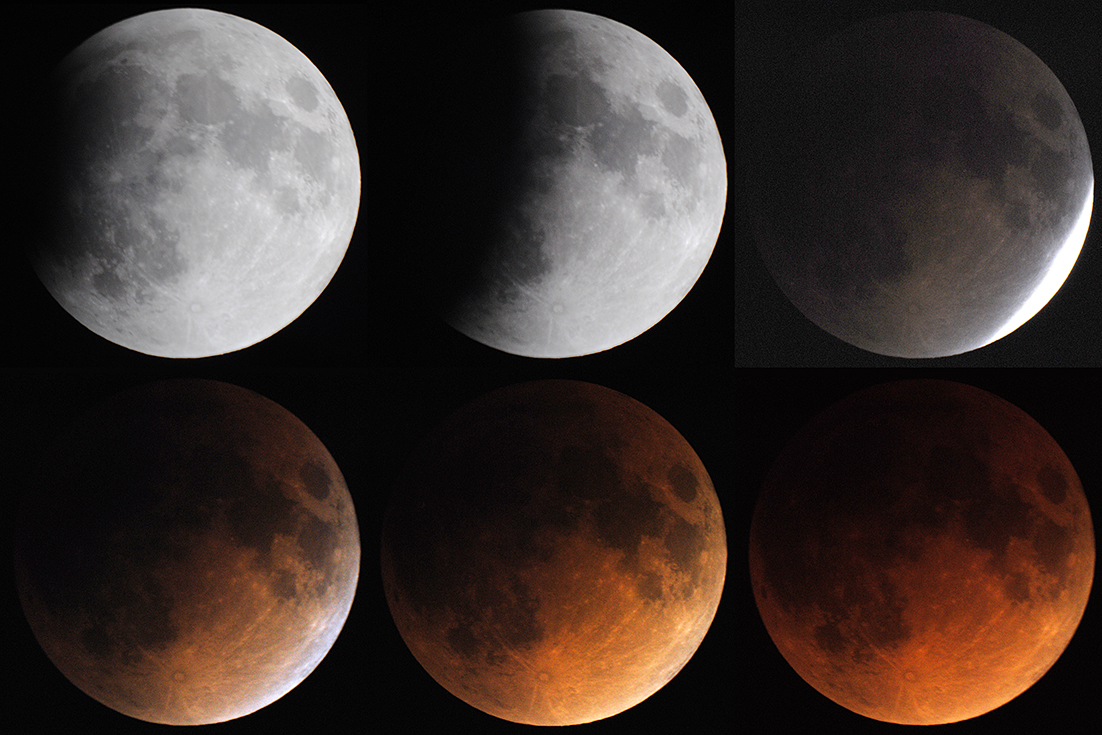31 January 2018 UT
Tucson, Arizona
Glenn Schneider
(Steward Observatory and the Department of Astronomy, The University of Arizona)

We
had a good view of TLE 2018 this morning from (my back yard) in Tucson
Arizona, with cooperative clear skies. Well, at least the “first
half” of the eclipse as we ‘lost’ the Moon (as expected) as it
descended into the shrubbery as morning twilight encroached. Our
last view before arboreal obscuration was at about 6:25 AM MST.
From here, partial ingress began with the Moon 30 degrees above the
(true, not arboreal) horizon, and totality began with it (only) 17
degrees up. The low altitude of the Moon as totality progressed
lead, to slightly degraded viewing (at highest air-mass) at our last
unobscured look just before mid-eclipse, but non-the-less it was a very
pretty sight.
The above photomosaic shows the of the progression of the eclipse as seen from here. Imaged with a 3.5-inch Questar and Nikon D3000 camera from top-left at 4:48 AM MST (three minutes before the end of the penumbral ingress) until trees became problematic soon after the last frame (bottom-right) was taken at 6:23 MST (7 minutes before mid-eclipse). This sequence of images is on close to 5-minute centers for nearly all frames (with some gitches in that timing for a few frames, but close to that). In this rendering I tried, best I could, to preserve/reproduce both the coloration, hue, and saturation of the moon during totality as it appeared to me in my minds eye with 20x80 binoculars in this rendering. That to see seemed a bit muted, not the “blood” red that some have commented on descriptively. In any event, that is the first mosaic.
Below are is just a few of the same frames, but among them some stretched to better see some of the color and brightness gradients near the second contact limb. Visually, I could manage to see visually (in the binos) the bluish stratospheric-ozone-filtered stratum soon before totality - though didn’t capture it very well in images this time. Though this does appears right on the limb in the bottom right of the second mosaic right after entering there into the Earth's umbra, though it is subtle.
The above photomosaic shows the of the progression of the eclipse as seen from here. Imaged with a 3.5-inch Questar and Nikon D3000 camera from top-left at 4:48 AM MST (three minutes before the end of the penumbral ingress) until trees became problematic soon after the last frame (bottom-right) was taken at 6:23 MST (7 minutes before mid-eclipse). This sequence of images is on close to 5-minute centers for nearly all frames (with some gitches in that timing for a few frames, but close to that). In this rendering I tried, best I could, to preserve/reproduce both the coloration, hue, and saturation of the moon during totality as it appeared to me in my minds eye with 20x80 binoculars in this rendering. That to see seemed a bit muted, not the “blood” red that some have commented on descriptively. In any event, that is the first mosaic.
Below are is just a few of the same frames, but among them some stretched to better see some of the color and brightness gradients near the second contact limb. Visually, I could manage to see visually (in the binos) the bluish stratospheric-ozone-filtered stratum soon before totality - though didn’t capture it very well in images this time. Though this does appears right on the limb in the bottom right of the second mosaic right after entering there into the Earth's umbra, though it is subtle.

Other Recent Tucson TLEs:
28 SEP 2015
04 APR 2015
15 APR 2014
21 DEC 2010
Return to Glenn Schneider's Eclipse Pages
Re